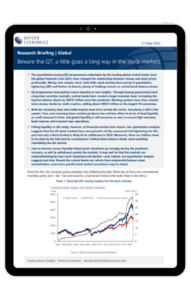Beware of quantitative tightening, a little goes a long way in global stock markets
 The quantitative easing (QE) programmes undertaken by the leading global central banks since the global financial crisis (GFC) have changed the relationship between money and stock prices profoundly. Money now matters more. And while stock markets have priced in quantitative tightening (QT) well before its launch, plenty of holdings remain on central bank balance sheets.
The quantitative easing (QE) programmes undertaken by the leading global central banks since the global financial crisis (GFC) have changed the relationship between money and stock prices profoundly. Money now matters more. And while stock markets have priced in quantitative tightening (QT) well before its launch, plenty of holdings remain on central bank balance sheets.
QE programmes have pushed excess liquidity to new heights. Through buying government (and corporate) securities outright, central banks have created a huge monetary base, increasing the big five balance sheets by US$12 trillion since the pandemic. Banking systems have then created more money stocks by credit creation, adding about US$23 trillion to the largest 10 economies.
Both the monetary base and credit impulse have since turned the corner, but plenty is still in the system. True, vast monetary base creation produces less and less effect in terms of total liquidity as credit demand is finite, but global liquidity is still excessive as seen in record-high voluntary bank reserves and reversed repo operations.
What you will learn:
- Global liquidity is still excessive but retreating: Now that the US stock market is hovering around the official definition of a bear market (declining 20% from its January peak), one might wonder about the role money or excess global liquidity plays in this.
- Money velocity is slowly picking up: Part of this is a consequence of simple maths. In a recession GDP falls but money stock does not automatically adjust (nor would you want it to), so that the result is inevitably a decline in velocity.
- The more liquidity in the system, the bigger QT is needed for the same effect: The effect of liquidity on asset prices changes over time, too. It has generally become weaker as liquidity becomes more abundant.
Tags:
Related posts

Post
Fixed Income: Kiwi bonds to fly high
We remain steadfast on our long-standing heavy overweight in New Zealand government bonds within our global DM fixed income allocations.
Find Out More
Post
Why the real yield on private wealth will keep falling globally
Despite the importance of returns on private wealth for long-term investors – be they households, asset managers, or pension funds – the fact that real yields have been on a downward trend across the world for decades seems to have escaped attention.
Find Out More
Post
Long-term interest rates to trend down in the Philippines
We expect the Philippines' 10-year government bond yield to trend down in 2023-2024, after rising continuously since Q3 2020.
Find Out More